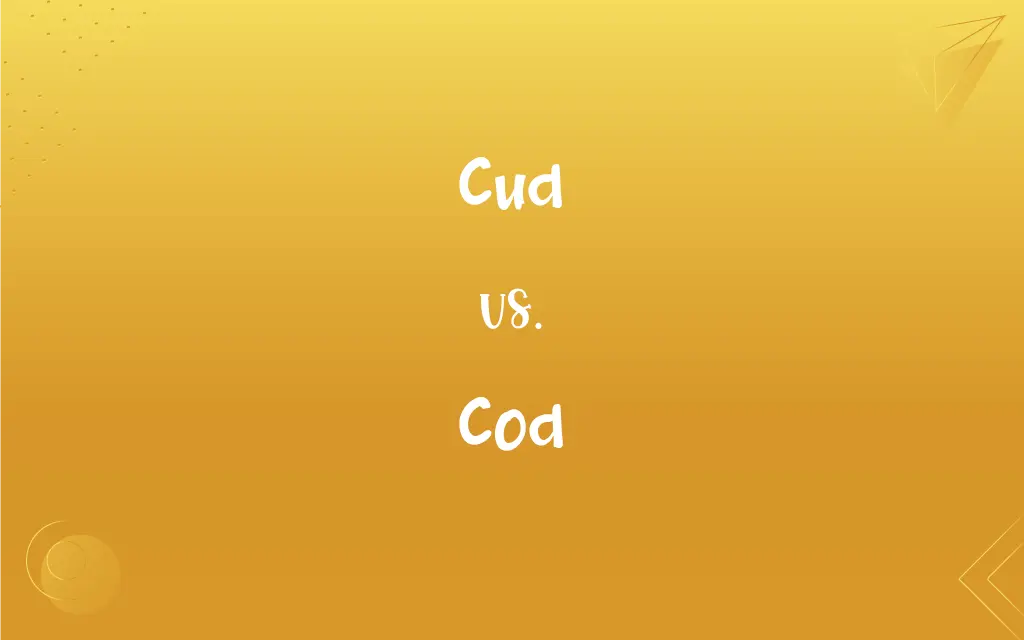Cud vs. Cod: What's the Difference?
By Harlon Moss & Aimie Carlson || Updated on May 23, 2024
Cud refers to partially digested food that ruminant animals regurgitate and chew again, while cod is a type of fish found in cold waters.

Key Differences
Cud is the term for partially digested food that ruminant animals, such as cows, bring back up from their stomach to chew again. This process, called rumination, helps these animals break down tough plant fibers and extract more nutrients. Cod, on the other hand, is a type of fish found in cold ocean waters, commonly known for its white, flaky flesh. Cod is a popular seafood choice and is often used in dishes like fish and chips. The term cod refers specifically to this fish species, which is prized for its mild flavor and nutritional benefits.
Cud is associated with the digestive process of certain animals. Ruminants, such as sheep, goats, and deer, also chew cud. This behavior is essential for their ability to efficiently digest and utilize nutrients from fibrous plant material. Cod is associated with marine life and fisheries. Codfish are not only important for culinary purposes but also play a significant role in the fishing industry and marine ecosystems. Cod populations are often monitored to prevent overfishing and ensure sustainable practices.
The term cud is primarily used in agricultural and zoological contexts. Farmers and veterinarians might discuss how well livestock are chewing cud as an indicator of their health and digestive efficiency. The term cod is used in culinary and ecological contexts. Chefs and consumers might discuss the quality of cod fillets, while marine biologists might study cod populations and their habitats to understand environmental impacts.
Comparison Chart
Definition
Partially digested food regurgitated for chewing
A type of fish found in cold waters
Context
Agricultural, zoological
Culinary, ecological
ADVERTISEMENT
Associated Animals
Ruminant animals (cows, sheep, goats)
Fish species (codfish)
Process
Chewed again to aid digestion
Harvested for food
Importance
Nutrient extraction for ruminants
Culinary use, fishing industry
Cud and Cod Definitions
Cud
Chewed again for nutrient extraction.
Deer were observed chewing cud at dawn.
Cod
A type of fish with white, flaky flesh.
Cod is often used in traditional fish and chips.
ADVERTISEMENT
Cud
Food brought back up for further chewing.
Sheep were seen chewing their cud under the shade.
Cod
Marine fish found in cold waters.
The fisherman caught several cod off the coast.
Cud
Partially digested food regurgitated by ruminants.
The cow chewed its cud leisurely in the field.
Cod
Popular seafood choice.
Baked cod is a healthy dinner option.
Cud
Part of ruminant digestive process.
Cows chewing cud helps them break down tough plant fibers.
Cod
Known for mild flavor and versatility.
Cod fillets can be grilled, fried, or steamed.
Cud
Food regurgitated from the first stomach to the mouth of a ruminant and chewed again.
Cod
See Atlantic cod.
Cud
Something held in the mouth and chewed, such as a plug of tobacco.
Cod
Any of various marine fishes of the family Gadidae, which includes the Atlantic cod and the haddock.
Cud
The portion of food which is brought back into the mouth by ruminating animals from their first stomach, to be chewed a second time.
Cod
(Archaic) A husk or pod.
Cud
(transitive) To bring back into the mouth and chew a second time.
Cod
(Archaic) The scrotum.
Cud
Alternative form of could
Cod
(Obsolete) A bag.
Cud
That portion of food which is brought up into the mouth by ruminating animals from their first stomach, to be chewed a second time.
Whatsoever parteth the hoof, and is cloven-footed, and cheweth the cud, among the beasts, that shall ye eat.
Cod
(obsolete) A small bag or pouch.
Cud
A portion of tobacco held in the mouth and chewed; a quid.
Cod
A husk or integument; a pod.
Cud
The first stomach of ruminating beasts.
Chewed the thrice turned cud of wrath.
Cod
The cocoon of a silkworm.
Cud
Food of a ruminant regurgitated to be chewed again
Cod
The scrotum (also in plural).
Cud
A wad of something chewable as tobacco
Cod
A pillow or cushion.
Cud
Regurgitated food for additional digestion.
The goat paused to chew its cud after grazing.
Cod
The Atlantic cod, Gadus morhua.
Cod
The sea fish of the genus Gadus generally, as inclusive of the Pacific cod (Gadus macrocephalus) and Greenland cod (Gadus ogac or Gadus macrocephalus ogac).
Cod
The sea fish of the family Gadidae which are sold as "cod", as haddock (Melanogrammus aeglefinus) and whiting (usually Merlangius merlangus).
Cod
Other unrelated fish which are similarly important to regional fisheries, as the hapuku and cultus cod.
Cod
Other unrelated fish which resemble the Atlantic cod, as the rock cod (Lotella rhacina) and blue cod (Parapercis colias).
Cod
A joke or an imitation.
I assume it all could just be a cod.
Cod
A stupid or foolish person.
He's making a right cod of himself.
Cod
Having the character of imitation; jocular. (now usually attributive, forming mostly compound adjectives).
“Illegitimi non carborundum” is a well-known example of cod Latin.
Dalton categorises Muse's latest composition as “cod-classical bombast”.
Cod
(Polari) Bad.
Cod
To attempt to deceive or confuse; To joke; To kid.
Cod
A husk; a pod; as, a peascod.
Cod
A small bag or pouch.
Cod
The scrotum.
Cod
A pillow or cushion.
Cod
An important edible fish (Gadus morrhua), taken in immense numbers on the northern coasts of Europe and America. It is especially abundant and large on the Grand Bank of Newfoundland. It is salted and dried in large quantities.
Cod
The vessel that contains the seeds of a plant (not the seeds themselves)
Cod
Lean white flesh of important North Atlantic food fish; usually baked or poached
Cod
Major food fish of arctic and cold-temperate waters
Cod
Fool or hoax;
The immigrant was duped because he trusted everyone
You can't fool me!
Cod
Harass with persistent criticism or carping;
The children teased the new teacher
Don't ride me so hard over my failure
His fellow workers razzed him when he wore a jacket and tie
Cod
Payment due by the recipient on delivery;
A collect call
The letter came collect
A COD parcel
Cod
Collecting the charges upon delivery;
Mail a package C.O.D.
Cod
Important species in the fishing industry.
Cod stocks are carefully managed to prevent overfishing.
FAQs
What does cod refer to?
Cod refers to a type of fish found in cold ocean waters, known for its white, flaky flesh.
Which animals chew cud?
Ruminant animals like cows, sheep, goats, and deer chew cud.
Why do cows chew cud?
Cows chew cud to further break down plant fibers and extract more nutrients.
Is cud chewing a sign of good health in ruminants?
Yes, chewing cud typically indicates that a ruminant's digestive system is functioning properly.
Where is cod commonly found?
Cod is commonly found in the North Atlantic and Arctic oceans.
What is cud?
Cud is partially digested food that ruminant animals regurgitate to chew again.
Is cod a sustainable seafood option?
Cod sustainability depends on fishing practices and regulations, with some populations being overfished.
How is cud different from regular food?
Cud is food that has been partially digested and regurgitated for further chewing.
What is the texture of cod meat?
Cod meat is known for being white, flaky, and mild in flavor.
What dishes commonly feature cod?
Cod is commonly used in dishes like fish and chips and baked cod.
What is the nutritional significance of cud chewing?
Chewing cud allows ruminants to break down cellulose in plants and absorb more nutrients.
What factors affect cod population sustainability?
Overfishing, environmental changes, and fishing regulations affect cod population sustainability.
What are the main predators of cod?
Larger fish, seals, and humans are main predators of cod.
Can humans eat cud?
No, cud is not suitable for human consumption; it is part of the ruminant digestive process.
How can you tell if a cow is healthy by its cud chewing?
Regular cud chewing and a relaxed demeanor often indicate a healthy cow.
How is cod typically prepared?
Cod can be grilled, baked, fried, or steamed.
Why is cod an important fish in the fishing industry?
Cod is highly valued for its meat, making it a staple in many diets and economies.
What are common substitutes for cod in recipes?
Haddock and pollock are common substitutes for cod in recipes.
Do all ruminants chew cud?
Yes, all ruminants engage in cud chewing as part of their digestion.
Is cod considered a nutritious food?
Yes, cod is high in protein and low in fat, making it a nutritious choice.
About Author
Written by
Harlon MossHarlon is a seasoned quality moderator and accomplished content writer for Difference Wiki. An alumnus of the prestigious University of California, he earned his degree in Computer Science. Leveraging his academic background, Harlon brings a meticulous and informed perspective to his work, ensuring content accuracy and excellence.
Co-written by
Aimie CarlsonAimie Carlson, holding a master's degree in English literature, is a fervent English language enthusiast. She lends her writing talents to Difference Wiki, a prominent website that specializes in comparisons, offering readers insightful analyses that both captivate and inform.































































